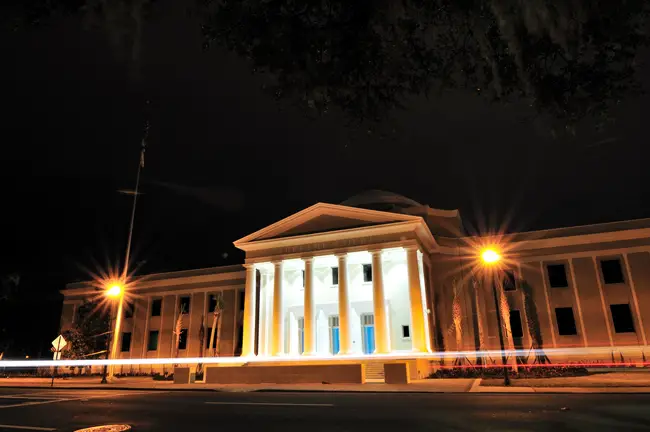
With a party-line vote Thursday, the Florida Senate approved a controversial proposal about the power of the governor to appoint replacements for retiring Supreme Court justices.
The proposed constitutional amendment (SJR 1188) would allow an outgoing governor to replace appellate or Supreme Court justices whose terms expire on the governor’s last day in office.
Democrats argued that the proposal, passed by the Senate in a 26-14 vote, would give the next governor the ability to pack the courts and is intended to give incumbent Gov. Rick Scott, who is seeking re-election, the ability to reshape the Florida Supreme Court.
Republicans contend the proposal, which thus far lacks a House companion, is aimed at avoiding a looming “constitutional crisis” over whether an outgoing or incoming governor has the authority to fill judicial vacancies.
The proposal, filed by Senate Judiciary Chairman Tom Lee, would allow the winner of the November election — Scott or, potentially, Democratic candidate Charlie Crist — to replace three Supreme Court justices who would have to retire on the same day the governor’s term ends, on Jan. 8, 2019. Justices have to retire at age 70 but can serve the remainder of their six-year terms.
Because of the retirement requirement, Justices R. Fred Lewis, Barbara Pariente and Peggy Quince, who make up part of the court’s left-leaning wing, will have to quit the bench when their six-year terms expire on Jan. 8, 2019. That is the same day the winner of the 2018 governor’s race will be inaugurated.
The issue came up when Gov. Lawton Chiles was leaving office after the 1998 election but wanted to replace a retiring justice. Incoming Gov. Jeb Bush argued that he should pick the replacement. The two governors struck a deal and jointly appointed Quince. In 2006, the Supreme Court issued an advisory opinion saying that the judicial nominating process can begin under the old governor even though the vacancy occurs after the justice’s term expires.
Lee’s proposal codifies case law to “maintain consistency with the way the Constitution operates,” he argued during floor debate.
“Someone has to be in charge. Someone has to make the decision. All we’ve done here is acknowledge that the executive powers of the governor continue until his or her successor is qualified to succeed them on inauguration day,” Lee, R-Brandon, said.
But Democrats objected that an incoming governor should have the ability to shape the ideological makeup of the bench instead of someone who was either voted out of office or who will no longer be the state’s chief executive.
“Let’s be real. There’s policy but we actually have a case before us. … Three judges of the Supreme Court are going to retire. They’re gone. So that Tuesday morning there’s three people to put on the Supreme Court. Now that Tuesday, we’re going to know who the governor is. It will be Rick Scott or some new governor,” Senate Minority Leader Chris Smith, D-Fort Lauderdale, argued. “Whoever the people vote for in November should make that decision.”
Sen. Arthenia Joyner, D-Tampa, objected that Lee’s proposal would “disenfranchise voters” by denying their choice of governor the ability to appoint judges.
“That just defies the logic of fundamental representative democracy,” she said.
The House does not have a similar proposal but Speaker Will Weatherford said Thursday Lee “made a compelling argument” and that the issue is still in play.
“I do believe it’s something that our body should consider. Whether or not it will get to the floor, or when it would get to the floor, probably too soon to say. But again, I didn’t know that they had passed it today. Happy to hear that. And now the ball’s in our court. We’ll take a look at it,” Weatherford said.
Lee acknowledged that the potential to tilt the state’s high court into a conservative-leaning bench is the source of Democrats’ angst but said that his goal is to prevent a showdown in the future.
“I don’t think we can let this go and be thrown to the courts. There will definitely be litigation. There’s way too much at stake. You see the food fights here over tort reform and trying to overthrow legislation in the courts and things like that. The stakes are just very high and we are in a very unfortunate position, a place in Florida history where we have so many justices that happen to retire at the same time,” Lee told reporters Thursday evening.
–Dara Kam, News Service of Florida





























A.S.F. says
Republican policy is at least consistent. Try to control the vote by restricting voter’s rights. Try to control politics at the state level by Gerry-mandering distrcits in their favor. Now, Florida’s latest move—Try to control the court by cherry-picking Chief Justices. Look at what just happened with the latest Supreme Court decision, split down party lines, that struck down any hope at controlling the power of big money donors to buy elections… There’s Republican politics for you.
Brian says
Only in Florida can the Constitution be twisted to one side of the political spectrum without the knowledge of the voters. This bill that the Senate passed has only one agenda: stack the Supreme Court with every super-strict conservative judge they can find, and become the next Texas as far as political stupidity. First, they will ban abortions, second they will tackle immigration reform to the likes we have never seen before, and if Whacko Rick gets reelected…….he might begin to talk about seceding from the union! All I know, is that we need to impeach Rick Scott today……get him out of office NOW, before he really does some serious and irreparable damage to our great state!
Genie says
Call me crazy, but I’ll like to see all candidates have to run for office. I don’t like the idea of politicians padding the courts, either side.
Cruz in says
Way to go Ricky !!!!
Anonymous says
ALL WILL DISLIKE THIS AT SOME POINT.